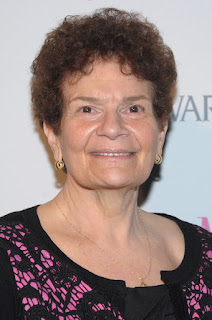"It was hard to say goodbye"
A couple of weeks ago, I had the opportunity to speak with Sister Paulette LoMonaco, the former head of Good Shepherd Services, for the column on leadership that I am writing for New York Nonprofit Media.
Sister Paulette is a giant in the field of New York City social services. She casts a large shadow. A lot of people are intimidated by her. I can say this with some authority, because I used to find her intimidating. (Being a nun has something to do with this, of course.)
As I have gotten to know her a little better over the years, though, I have seen that Sister Paulette is someone with a strong BS detector and a healthy sense of humor. I'm hoping that some of this came across in my interview with her.
Here are some outtakes from the session that didn't make the final piece:
Berman: You won’t remember because I was just a pipsqueak, but you and I first met more than 25 years ago in Red Hook when I was working on creating the Red Hook Community Justice Center. After some initial skepticism, Good Shepherd Services welcomed us to the neighborhood and was enormously helpful in establishing the Justice Center. So I guess I wanted to start just by thanking you for that.
LoMonaco: I do remember. You know what, when we moved into Red Hook in 1980, there weren’t a lot of nonprofits there. So when you came to the neighborhood, it was great to have a partner. And I do remember the students from the high school that helped you create the youth court in Red Hook, which was a wonderful experience for them. In the years since then, we have also worked hand in glove with RHI (the Red Hook Initiative). I think we've all benefited from the partnership.
Berman: When you stepped up to be the executive director of Good Shepherd Services, did you think you would be in the position for decades? What was your mindset at that point?
LoMonaco: I don't know if I really had anything in mind other than just hoping that I could pull this off. I loved the agency. I loved our mission. I wanted to expand on Sister Mary Paul Janchill's vision, which was in the direction of more community-based programming. I just took a deep breath and moved into it.
Berman: Do you buy into the importance of birth order? You are the oldest of seven girls. Do you think that being an older sister played any role in your becoming an executive director?
LoMonaco: Yes, it probably did. In a way, I was used to taking care of people. That's why operating a residential program felt like coming home to me.
Berman: Were you happy with how your leave taking went? Was there anything you would've done differently with the benefit of hindsight?
LoMonaco: I received tremendous recognition and it was hard to say goodbye. Then immediately, I found other things to do, because I recognized that you can't leave such a high-power job and do nothing. I had a life planned out for me after I left, but then COVID interrupted.
Berman: How do you like working on Zoom?
LoMonaco: Oh, I like Zoom. I think it has brought us a new level of connectedness and transparency. For example, there would be times when a limited number of people would be able to fly to a place to participate in a meeting. Now, with Zoom, it's open to everyone. I think Zoom has really increased our equity ability.
Berman: As you look back on your career, what are you most proud of?
LoMonaco: I guess I'm proud of the impact that Good Shepherd has made in moving public policy and creating programs that are really responsive to the needs of children and families. Going back to before my time, we were among the very first to open a preventive services program, before the Child Welfare Reform Act was passed. I feel lucky to have had the opportunity to be a part of moving the system that cares for children and families.


